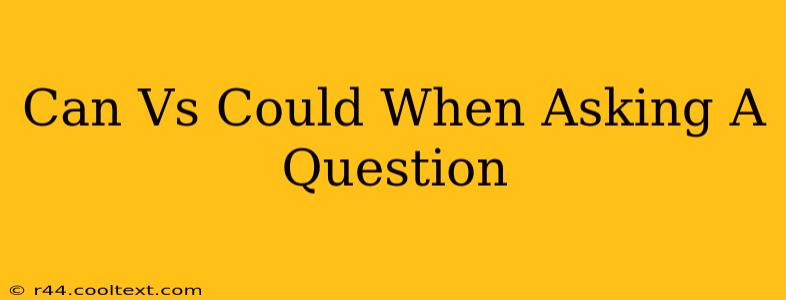Choosing between "can" and "could" when asking a question can be tricky, even for native English speakers. Both words relate to ability and possibility, but their nuances create distinct contexts. This guide will clarify their usage, helping you confidently select the right word for any situation.
Understanding the Core Differences
At their heart, "can" and "could" represent different levels of formality and possibility.
- Can: Expresses present ability, permission, or possibility. It's generally more informal.
- Could: Expresses past ability, polite requests, or less certain possibilities. It's typically more formal.
Let's delve deeper into specific scenarios where each word shines.
Using "Can" in Questions
Here are some common ways "can" is used in questions:
Ability:
- "Can you lift that box?" This asks about someone's present physical ability.
- "Can you speak French?" This inquires about current language skills.
- "Can this software run on my old computer?" This questions the software's current compatibility.
Permission:
- "Can I leave early today?" This politely asks for permission.
- "Can we go to the park?" This requests permission for a group activity.
- "Can I borrow your pen?" This is a common request for something.
Possibility:
- "Can it snow in April?" This asks about a possibility within the present timeframe.
- "Can this be true?" This questions the likelihood of something being factual.
Using "Could" in Questions
"Could" adds a layer of politeness, uncertainty, or a past tense element to your question.
Polite Requests:
- "Could you please pass the salt?" This is a much more polite way to make a request than "Can you pass the salt?".
- "Could I get a coffee, please?" This is a courteous way to order a drink.
- "Could you help me with this project?" This is a more formal and polite request for assistance.
Past Ability:
- "Could you play the piano when you were younger?" This asks about a past ability.
- "Could she swim before she started lessons?" This questions a past skill.
Less Certain Possibilities:
- "Could this be a problem?" This expresses uncertainty about a potential issue.
- "Could it be raining later?" This implies a less definite possibility compared to "Can it be raining later?".
When to Choose Which: A Quick Guide
This table summarizes the key differences:
| Feature | "Can" | "Could" |
|---|---|---|
| Formality | Informal | Formal |
| Time | Present | Present or Past |
| Certainty | More certain | Less certain |
| Usage | Ability, permission, possibility | Polite requests, past ability, less certain possibilities |
Mastering the subtle distinctions between "can" and "could" elevates your communication skills, making your questions clearer and more appropriate for the context. Remember to consider the level of formality and the timeframe of your question when making your choice.

